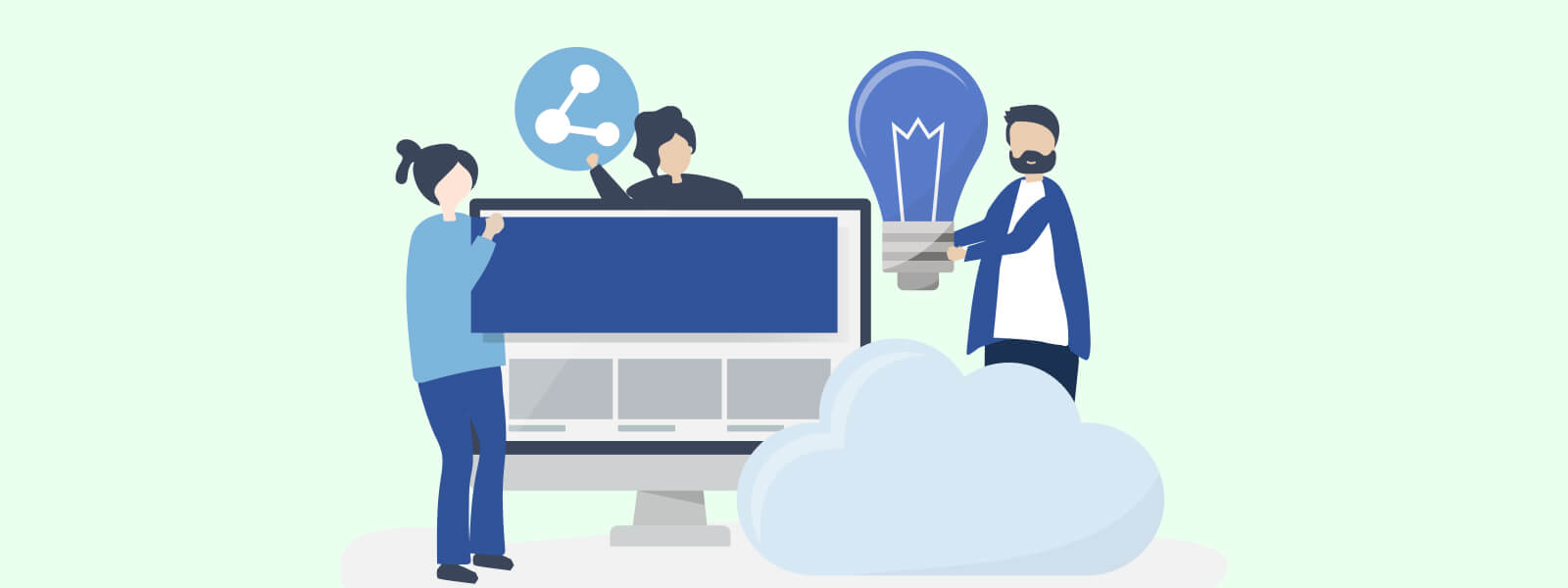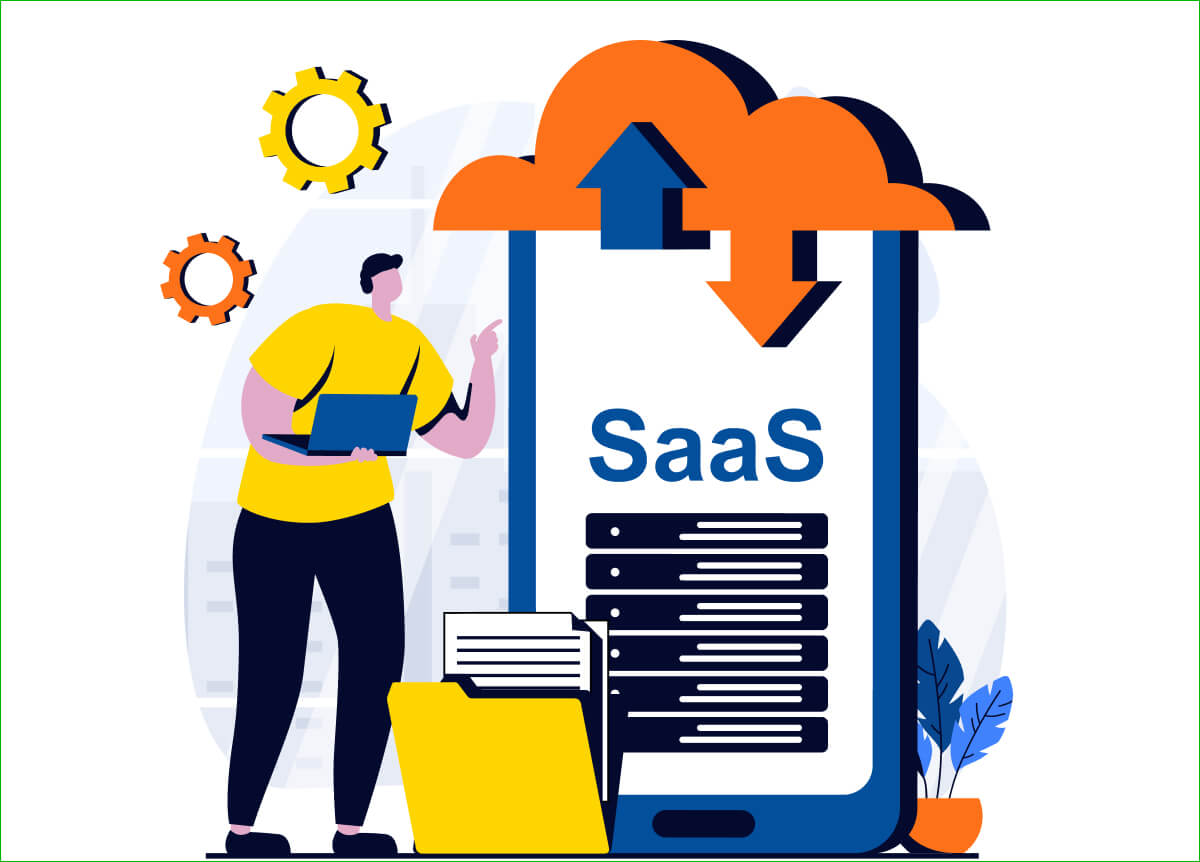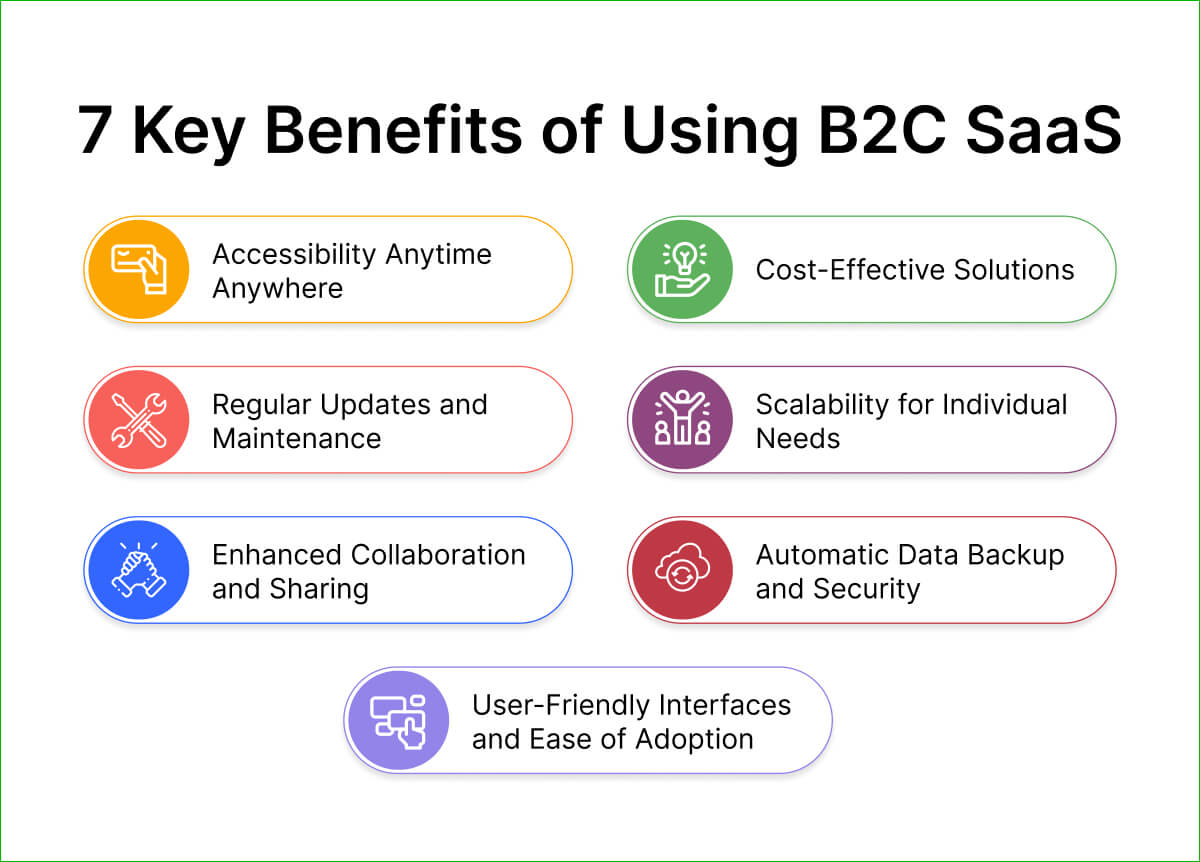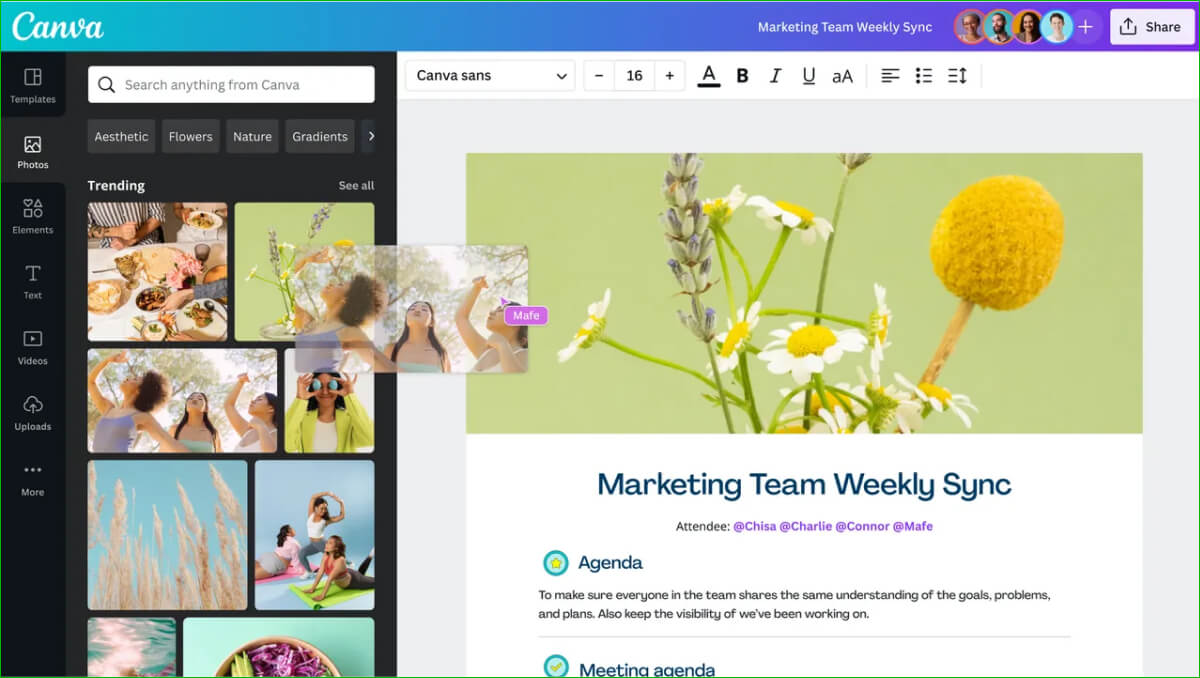 SAAS
SAAS

28 November, 2023

In the dynamic realm of modern business technology, where innovation is the heartbeat of success, B2C SaaS emerges as a beacon of transformative power. Short for Business-to-Consumer Software as a Service, B2C SaaS is not just an acronym. It’s a catalyst reshaping how businesses engage with their end consumers.
This cloud-based software model, operating on a subscription basis, transcends traditional boundaries, offering companies a scalable, customer-centric, and seamlessly adaptable solution. A digital revolution that empowers businesses to not only meet but exceed customer expectations, fostering a new era of efficiency, engagement, and unparalleled growth.
Contents

B2C SaaS is a software delivery model tailored for individual consumers. This service is not confined by location, it harnesses the internet’s power, granting customers access to the software from virtually anywhere on the globe.
Consider photo editing software – a prime illustration of B2C SaaS. The beauty lies in its accessibility, you can use it online, eliminating the need for hefty downloads or installations. Additionally, everyday tools like email and word processing, essential for personal tasks, can also be seamlessly delivered through the B2C SaaS model.
It focuses on developing user-friendly and intuitive software applications that enhance the customer experience and add value to their daily lives. These solutions cover a wide range of industries and sectors, including entertainment, health and wellness, productivity, finance, e-commerce, and more.

B2C SaaS provides users with the flexibility to access software applications from any location with an internet connection. This accessibility ensures that consumers can seamlessly integrate these tools into their daily lives, whether at home, work, or on the go.
One of the primary advantages of B2C SaaS is its cost-effectiveness. You can avoid the upfront expenses associated with purchasing and maintaining software. Instead, they opt for subscription plans, allowing them to pay only for the services they use, making advanced software solutions more financially accessible.
Providers of Individual-Focused SaaS take care of software updates and maintenance tasks, relieving users of the burden of managing these aspects. This ensures that consumers always have access to the latest features, security patches, and improvements without the need for manual updates.
Tailor the scale of your software solution to accommodate your evolving needs with the Subscription-Based Service model. Whether you’re a casual user or require more extensive features, the subscription model allows for easy scaling.
Many User-Centric SaaS applications are designed to facilitate collaboration and sharing. This is particularly beneficial for users working on projects or tasks that involve multiple individuals. The cloud-based nature of this model enables seamless collaboration, enhancing productivity and efficiency.
Providers of Personalized SaaS often implement robust security measures and automatic data backup systems. This ensures the safety of user data, offering peace of mind in the event of unforeseen circumstances. Users can focus on their tasks without the constant worry of data loss or security breaches.
Platforms focusing on the Consumer Experience prioritize user-friendly interfaces and streamlined functionalities. This approach reduces the learning curve, making it easier for individuals to adopt and integrate new software into their routines without the need for extensive training.
Are leveraging the B2C SaaS business model to offer software solutions directly to individuals, improving accessibility and convenience. This model has become increasingly popular as more consumers embrace technology and seek user-friendly solutions for their everyday needs.
The B2C SaaS business model refers to software-as-a-service companies that cater to individual consumers rather than businesses. Unlike B2B SaaS companies that target other businesses, B2C SaaS companies focus on providing software solutions directly to the end-users. This model has gained popularity due to its ability to offer convenience and cost-effectiveness to consumers.
The essence of the B2C SaaS business model lies in its accessibility and user-friendliness. It’s about providing software solutions that enhance the daily lives of individuals, whether it’s streamlining personal tasks, enjoying entertainment, or boosting productivity. Subscription plans replace the traditional model of purchasing software, making these advanced solutions more financially feasible for the everyday user.
For businesses venturing into the B2C SaaS space, the key is to understand and respond to the unique needs of individual consumers. The model thrives on delivering not just software but an experience tailored to the preferences and convenience of the end user. It’s a shift from conventional ownership to a dynamic, subscription-based relationship, where businesses continuously adapt to meet the evolving demands of their individual customers.
Understanding these differences between B2B SaaS and B2C SaaS is essential for businesses planning to adopt or provide software solutions in the SaaS industry. By catering to the specific needs and preferences of their target audience, companies can develop effective marketing strategies, refine their product offerings, and deliver exceptional customer experiences.

With the ability to deliver software applications and services directly to consumers, the future of B2C SaaS is promising.
(SaaS) has reinvented the way businesses operate and has become an integral part of the tech industry. B2C SaaS, which focuses on providing software solutions directly to consumers, has witnessed tremendous growth over the years. So, what does the future hold for B2C SaaS?
As we peer into the future of Business-to-Consumer Software as a Service (B2C SaaS), a landscape of innovation and evolution unfolds.
Streaming platforms like Netflix and Spotify already employ sophisticated algorithms to curate personalized content. The future will likely witness even more advanced personalization, tailoring software experiences to the unique preferences and behaviors of individual users.
AI-driven chatbots and virtual assistants are becoming commonplace. In the future, we can expect more seamless integration of AI and machine learning to enhance user experiences, automate tasks, and provide intelligent insights.
Mobile devices are integral to our daily lives. The future of B2C SaaS will likely see an even greater emphasis on mobile-first design, ensuring seamless integration with the devices that consumers use most frequently.
According to a report by Zuora, the Subscription Economy Index showed a year-over-year growth rate of 435% in subscription businesses compared to product-based companies from January 1, 2012, to January 31, 2022.
Subscription models provide a steady revenue stream, encourage customer loyalty, and allow businesses to adapt quickly to changing consumer needs.
Trust is paramount in the digital age. B2C SaaS providers will increasingly invest in robust security measures and transparent privacy policies to maintain consumer trust and compliance with data protection regulations.
Cloud-based solutions have already made B2C SaaS accessible globally. The future will likely witness an even greater expansion into emerging markets, bringing advanced software solutions to a broader audience.
The future of B2C SaaS is marked by a convergence of personalization, cutting-edge technologies, and a commitment to user-centric design. As the digital landscape evolves, B2C SaaS will continue to empower individuals with innovative solutions that seamlessly integrate into their daily lives.
Consumer SaaS companies are leading the way in delivering tech-based solutions through a SaaS model. FLG Partner and SaaS CFO, Eric Mersch, shares insights into the key metrics and performance benchmarks for these innovative companies.
These companies have managed to capture the attention of consumers with their innovative solutions and user-friendly interfaces. In this section, we will explore the top 5 B2C SaaS companies that are making waves in the industry.

Zoom has gained immense popularity as a leading video conferencing software, especially during the pandemic. Its user-friendly interface and seamless performance have made it the go-to choice for individuals and businesses alike.
Features:

Canva has revolutionized the design industry by offering an easy-to-use graphic design tool. Its drag-and-drop functionality and extensive library of templates have made it a favorite among non-designers who want to create stunning visuals.
Features:

Netflix has disrupted the entertainment industry by providing a vast library of movies and TV shows on demand. With its user-friendly interface and personalized recommendations, it has become a household name for streaming content.
Features:

Spotify has transformed the way we listen to music with its streaming platform. Users can access millions of songs, create personalized playlists, and discover new music based on their preferences.
Features:

Airbnb has disrupted the hospitality industry by enabling individuals to rent out their homes or book unique accommodations around the world. Its user-friendly platform and diverse range of listings have made it a popular choice for travelers.
Features:
These top 5 B2C SaaS companies have significantly influenced their respective industries with their innovative solutions and user-focused approach. By continuously evolving and meeting the ever-changing demands of consumers, they have successfully established themselves as leaders in the market. Whether it’s video conferencing, graphic design, entertainment streaming, music listening, or accommodation booking, these companies have transformed the way we live, work, and play.
Must focus on key metrics and benchmarks to measure their success. These metrics include customer acquisition cost, lifetime value, churn rate, and MRR growth. By analyzing these key performance indicators, B2C SaaS companies can gain valuable insights into their business and make informed decisions to drive growth.
It is crucial for consumer SaaS companies to continuously monitor and optimize these metrics to stay competitive in the ever-evolving tech landscape. With the right metrics and benchmarks in place, B2C SaaS companies can thrive and provide exceptional value to their customers.
Check also: Level Up Your Cloud Game: IaaS vs PaaS vs SaaS